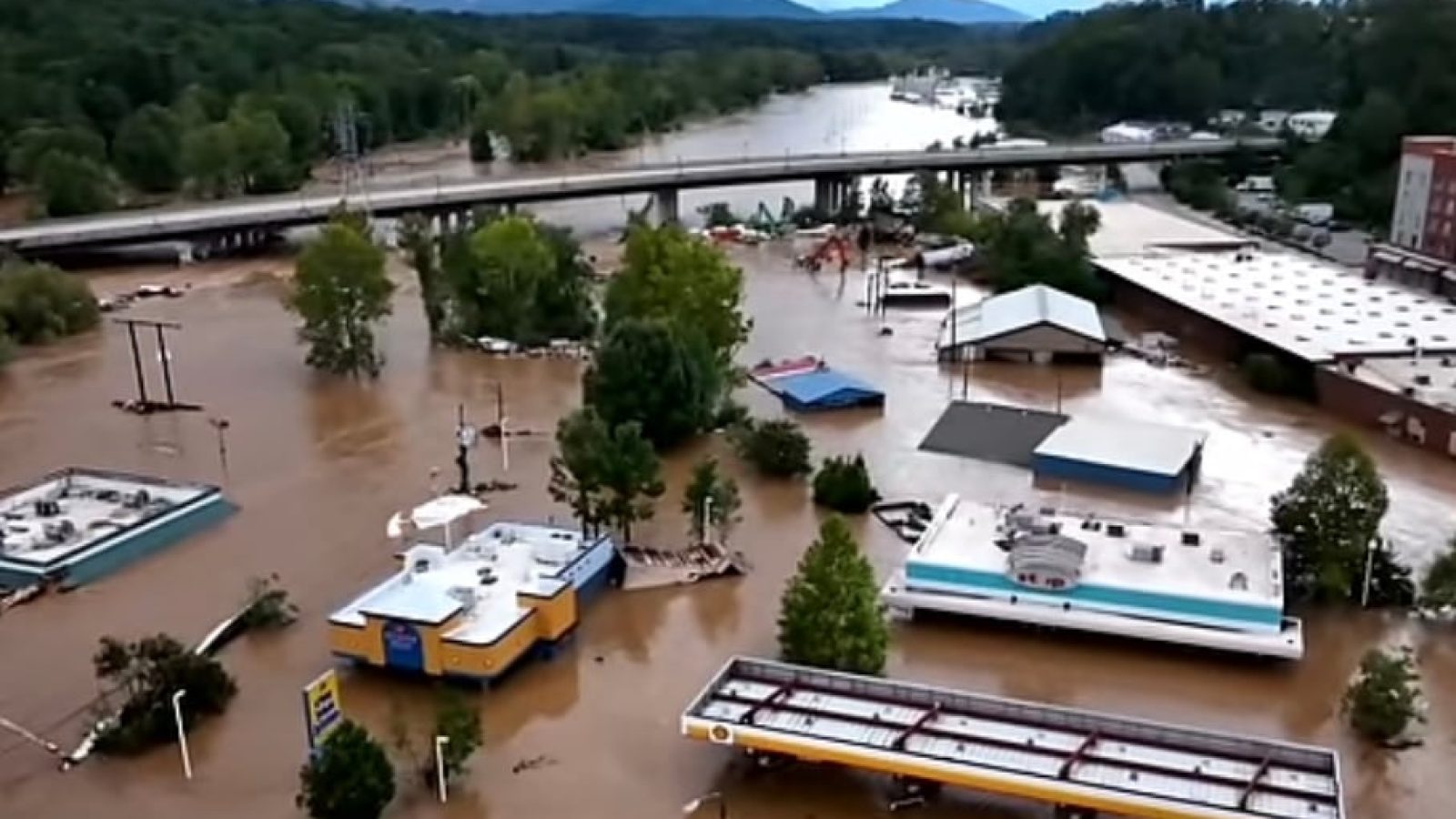Hurricane Helene has left a path of destruction across the Southeastern United States and caused catastrophic flooding.
Western North Carolina has been decimated by the storm, with hundreds of road closures.
According to social media users, Asheville, a city of nearly 100,000 residents, is isolated and only accessible by air.
“Asheville, NC is accessible only by air,” one social media user said.
“No electricity, no gas, no food or running water, no banks, no school, what about hospitals??? The list is endless. How do you start over? It’s mindblowing. And the small towns around Asheville not in any better shape,” she claimed.
Asheville, NC is accessible only by air.
No electricity, no gas, no food or running water, no banks, no school, what about hospitals??? The list is endless. How do you start over? It’s mindblowing. And the small towns around Asheville not in any better shape. pic.twitter.com/nMzPSv6LfZ
— Mary Alex (@Boomer54Mary) September 28, 2024
Asheville is the 11th-largest city in the state and has a population of approximately 95,000, according to North Carolina Demographics.
Asheville Citizen Times reports:
Travel in and out of much of Western North Carolina is nearly impossible after heavy rains and flooding battered the state in the path of Hurricane Helene.
The intense storm made landfall Thursday night and roared through parts of Florida, Georgia, North Carolina, South Carolina, Virginia and Tennessee. At least 10 people have been confirmed dead in North Carolina, according to Gov. Roy Cooper’s office Saturday night. Swift-water and helicopter rescue crews have rescued more than 200 people since Thursday.
At least 200 roads are closed in North Carolina as of Sunday morning, including Interstate 40 and Interstate 26 at the Tennessee-North Carolina border, according to the state’s road closures map. The I-40 closure near the state line is long-term. I-40 also is closed at Old Fort Mountain. NCDOT estimates it will reopen there by noon Tuesday, Oct. 1.
You can follow road closures at drivenc.gov.
WATCH:
Lake Lure…debris piled up in the water pic.twitter.com/fAxqsHYvzg
— Hannah Goetz (@HannahGoetztv) September 29, 2024
All of western NC. https://t.co/l9eaMQYvFm
Boone, Asheville, Swannanoa, Black Mountain, Chimney Rock, so much destruction. Helene is our Katrina. pic.twitter.com/SPJ98Ojaic— DelanaV (@DelanaV) September 29, 2024
WATCH:
“The North Carolina Department of Transportation (NCDOT) advise no one travel to or around Western North Carolina, and drivers should consider all roads closed,” WLOS stated.
View of @NCDOT road closures map at 2:27 pm 9/27/224. Visit https://t.co/NQ7Q7tv8L6 for updates and please heed state and local emergency management officials
. #TurnAroundDontDrown #ncwx #wncwx #cltwx pic.twitter.com/hJCOR68Lmu
— NorthCarolinaEE (@NorthCarolinaEE) September 27, 2024
Asheville’s gone. no one’s getting back to me. no calls can get through. people i saw almost everyday have gone completely dark. all that’s clear is that everything you’ve come to know and love can be washed away from you in an instant. i knew this biblically, but now personally. pic.twitter.com/2BPZrDI7FO
— zantae
(@DeathAngelUSA) September 28, 2024
From the Associated Press:
Floodwaters pushed by the remnants of Hurricane Helene left North Carolina’s largest mountain city isolated Saturday by damaged roads and a lack of power and cellphone service, part of a swath of destruction across southern Appalachia that left an unknown number dead and countless worried relatives unable to reach loved ones.
The storm spread misery across western North Carolina and eastern Tennessee, where on Friday authorities used a helicopter to rescue dozens of people from the rooftop of a flooded hospital. In North Carolina alone, more than 400 roads remained closed on Saturday as floodwaters began to recede and reveal the extent of damage.
North Carolina Gov. Roy Cooper said supplies were being airlifted to that part of the state. Buncombe County officials said Interstate 26 between Asheville and South Carolina had reopened, but most other routes into the city were impassible.
WATCH:
WATCH:
FOX Weather added:
Drone video captured above the historic Biltmore Village in western North Carolina shows the impact of more than a foot of rainfall on the community around Asheville during Hurricane Helene.
A record crest of the nearby Swannanoa River sent floodwaters racing through the village, destroying the first floors of many buildings and trapping residents who did not evacuate.
The drone video showed water levels reaching the first floors of several structures but still below the height of traffic lights, which are typically at least 20 feet tall.
Biltmore Village, originally constructed in the 1800s for workers of the Biltmore Estate, has since become a popular tourist destination.
As of Saturday, North Carolina Governor Roy Cooper’s office reported that more than 200 people had been rescued from floodwaters, with rescue operations expected to continue for several more days.
Buncombe County officials confirmed multiple fatalities around Asheville but noted the situation remained fluid, with at least 60 people still missing in the region, which has a population just shy of 300,000.
This is a Guest Post from our friends over at 100 Percent Fed Up.
View the original article here.




Join the conversation!
Please share your thoughts about this article below. We value your opinions, and would love to see you add to the discussion!